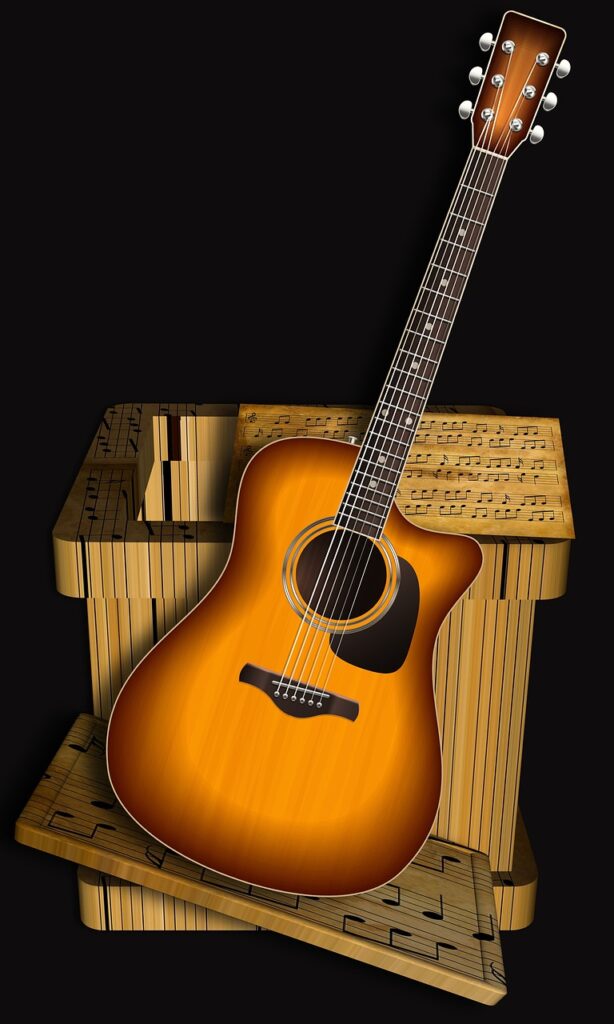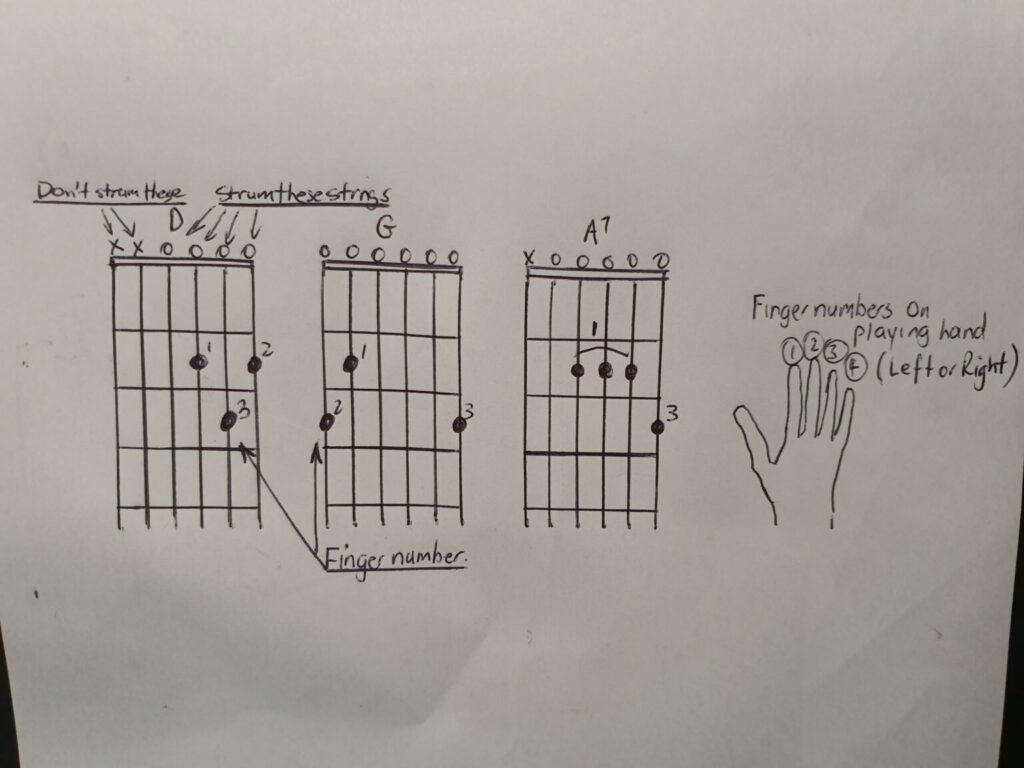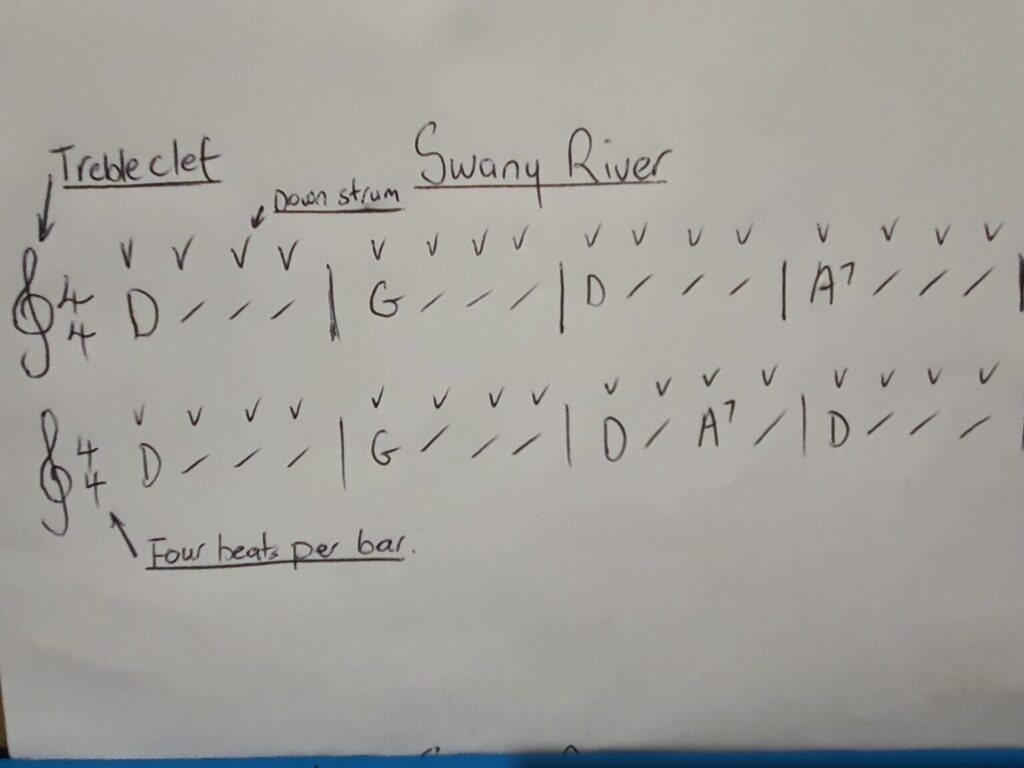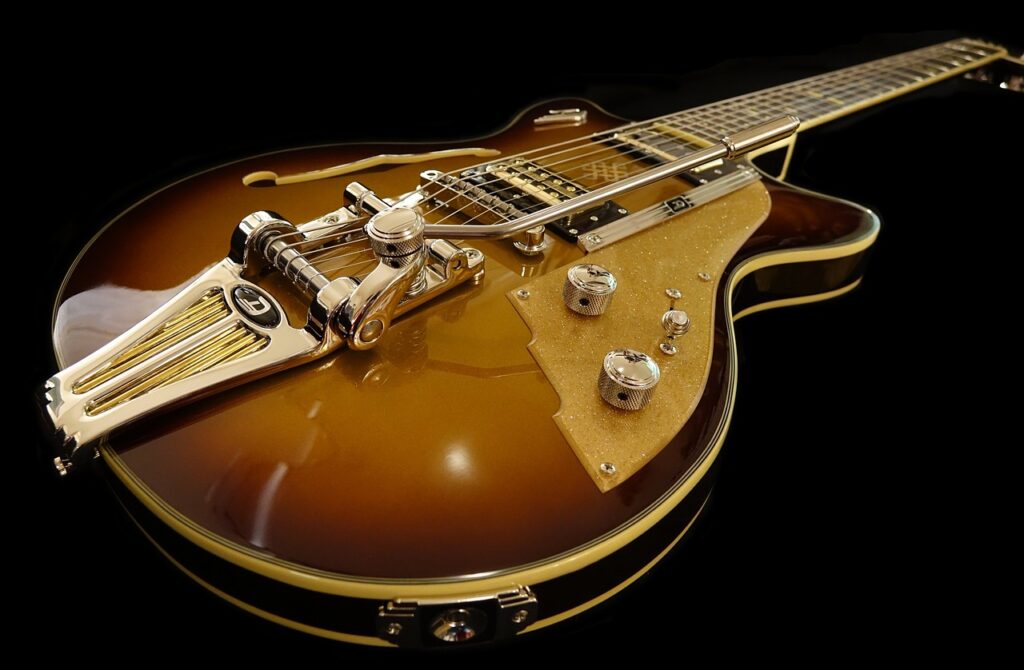Music is well recognized as the “universal language”. There are few more easily accessible instruments for the beginner to start producing music on than the humble guitar. As you consider the best way to learn to play the guitar at home we will be investigating the “ins and outs” of what this will require.
As a guitarist with 34 years of experience on the instrument. I’m telling you that it is entirely possible for any person, with a relative amount of enthusiasm, to start making progress toward playing wonderful tunes on the guitar at home. There is little need for a teacher, as such, especially during the initial stages of learning the instrument in the comfort of your own home.
Playing the guitar is a great way of reducing stress levels, providing a distraction from the everyday potential concerns of life, and making new like-minded friends. It’s something, as a builder, I’ve always been able to “fall back on” and has provided many opportunities that would not have been available otherwise.
So How Do We Get Started on Our Guitar Playing Journey
It may go without saying yet the best place to start is quite obviously acquiring yourself a guitar. Jumping around the house playing the air guitar just isn’t the same thing so it’s fortunate that there are many manufacturers of guitar and they are quite usually widely available in most countries throughout the world. The guitar should have all its strings and it is also beneficial to acquire an electronic tuner to make sure your guitar is in tune during the initial stages of getting your ear accustomed to the tuning.
We don’t have to have the best guitar available to increase our chances of success on the instrument. My first guitar was one that my precious Nanna had lying around the house. It was a half-size guitar and far from the best available at the time. Yet my dedication, coupled with some simple pointers, saw me make quick progress on my path to mastering the instrument.
So Why Are We Doing This – Worth Consideration
Before we start anything in life it is beneficial to establish our motivation for doing so. At this planning stage, it is good to take a little time to clarify exactly why it is that you would like to play the guitar. It’s not essential to have the purest of motivation yet motivation itself is a great means of ensuring that efforts continue towards completing the tasks required to become fluent on the guitar.
As an aspiring thirteen-year-old I was fascinated by the guitar and my mother was enthralled by Cat Stevens (Tea for the Tillerman). So my initial motivation to start playing was actually to see my mother happy with my efforts. It’s a simple type of motivation yet the happiness of others is very important and, in hindsight, my motivation was pure enough to see me through the initial challenges of enduring the learning process.
It’s good to consider, also during the planning process, what type of music you would like to play. There is no better motivation than listening to one of your favorite artists and saying to yourself “Gee I’d like to play that”. Choosing something that means something special to you will make it easier to push through more advanced techniques on the guitar.
What is Best to Start On – Electric or Acoustic guitar

You know what – There is very little difference between how an electric guitar and an acoustic guitar play. They both have the same number of frets, generally and are very similar in the way chords or melodies are played on them. It depends upon availability.
However, an electric guitar will usually need to have an accompanying amplifier for you to be able to hear it properly. So in consideration of this, I’d probably recommend getting an acoustic guitar first. They are far more portable and don’t require an amplifier. However, if there is an electric guitar more easily accessible you will find that either option will be suitable when starting your guitar-playing journey.
Keep It Simple At First – Get It Right Before Moving On
As fortune would have it. We had a very well-known guitarist as a family friend who was able to show me exactly what I’m going to show you today. A simple progression of three chords that took me months to master. Yet once I’d mastered these first three chords I was able to apply them to literally a thousand different songs.
To play guitar there is no necessity to be able to read music as such yet it is good to have a grasp of a few basic musical concepts. Like how music is divided into Barres and has a time signature etc. It’s best to start simply so below I’ve illustrated the three chords that I started with. So once your guitar is in tune it’s time to go ahead and start trying to produce these three chords on the guitar.

Now at first as you attempt to make these chords on the guitar it may feel strange and foreign. Please stay motivated for rather soon, with practice, this whole process shall become like second nature. So next we will be wanting to attempt to change between the chords to produce something that starts to resemble a song. Take your time and remember that this isn’t going to be easy for anyone yet so worthwhile in the end. Below is a simple progression you will find benefit in starting upon. This is where I started and the relative simplicity is the best place, from my experience, to begin.

Note that the piece I have provided is in what’s known as 4/4. This means that the most common time signature has four beats to the bar. You will want to start by giving the guitar a downward strum, on each beat of the bar, for each of the four beats of the bar. Again, over time, your changes between the chords will become more fluent and you will be getting closer to making this sound in rhythm like an actual song.
Keep It simple at first. Don’t succumb to the attraction of putting further material in front of you until you have gained the ability to make these three chords sound like a song. This way you will be encouraged, in the right way, by your progress and you will have a song to play at the next barbecue or for your friends.
Possible Challenges On Our Path to Guitar Utopia
After practicing for some time you WILL find that the tips of your fingers may become sensitive for they are not used to having such contact with the strings. You may have heard the term in the Bryon Adams song “The Summer of 69”. In that song, he sang words to the effect of “got my first real six-string,,, played it till my fingers bled”. Yes, I know the words were slightly different yet the fingertip sensitivity is something that will occur. To remedy this my initial guitar mentor taught me to dip my fingers in mentholated spirits which very quickly made my fingertips tougher so I’m suggesting this may be of benefit to you.

I’ll never forget sitting down at the family barbecue and playing my first song for the family and friends. Of course, my wonderfully cheeky brother had to say “Well that’s great but it’s a shame you can’t sing” lol. Even though I didn’t find it incredibly humorous at the time, to say the least, it gave me the driving motivation to start developing my singing voice. At the time I was ‘hopeless’ and could barely sing Happy Birthday in tune. Yet each day that I heard the chords on the guitar it developed my ear and eventually, I was able to sing well. In fact, without blowing my own whistle, I’ve sung in numerous choirs, won competitions, and received wide acclaim for my vocal ability. I’m putting this down to learning the guitar so please stick with it.
Oh and one more thing. I’d suggest not leaving your guitar next to your bed when you go to sleep. One morning I jumped out of bed and stood straight on my guitar. Subsequently, causing much damage and making it necessary to have a professional fix it. So it’s recommended to perhaps get a guitar stand or store it in a safe position in your room.

A wonderful Instrument of Wellbeing
So in wrapping this particular story up. Let’s maintain our focus on the beneficial outcomes of learning to play the guitar. Like anything in life, it will require a level of dedication and a relative amount of enthusiastic motivation to achieve our guitar-playing goals.
There are other facets to becoming a long-term guitar-playing advocate like string replacement and guitar maintenance and setup. in the initial stages, it may be advised to get help from a professional in these areas or conduct further research on how to do this yourself.
Hoping you’ve received a clearer way forward after reading this. As an experienced guitar teacher, technician, vocalist, and public performer I feel that I’m adequately qualified to help you with any questions you may have regarding your guitar playing. So feel free to ask me a question or comment below and I will do my best to be of assistance.
Good day and happy guitar playing.
Gavin


